Hope

ON THE DAY Brett Kavanaugh was confirmed by the Senate to a lifetime seat on the Supreme Court, I tweeted this: “Today was a day of protest, rage, mourning, lament. Tomorrow we go on by going deeper, and learn that hope is not a feeling, but a decision—based on whatever we call faith. Stay strong and take care of each other.”
The nation is in trauma, with many women and people of color in particular being retraumatized almost every day. But Advent is upon us, and the message of that liturgical season never changes. Advent is a season of waiting for the coming of Christ. Christ will come again, and not just ultimately but time and time again, in all kinds of unexpected ways.
So, in Advent, we wait—expectantly—for Jesus Christ to come again in our personal and our public lives. That is our hope, based not on optimism but on faith.
The situation we face in Donald Trump’s autocratic impulses and actions is indeed a constitutional crisis, the severity of which will depend, in part, on whether our institutions and structures, in the wake of the midterm elections, will hold the executive accountable, or not.
This is also a moral crisis regarding whether our “better angels,” as Abraham Lincoln put it, or our worst demons, as Donald Trump seems to evoke every day, will finally triumph. As they say, the jury is still out on that. Trump has opened a Pandora’s box of white racial and male resentment, fear, and hatred, and those forces are not going back into the box, despite election results. The battle between our better angels and our worst demons will be the spiritual battle of our political life for the unforeseeable future.
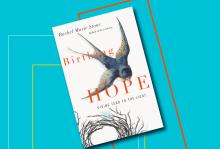
IN HER LATEST BOOK, Birthing Hope: Giving Fear to the Light, Rachel Marie Stone spiritually illuminates a painstaking, sometimes isolating, and often highly medicalized event in the life of a woman. In uncovering her own journey giving birth, Stone invites us to question our understandings of pain and passage, deliverance and rebirth, illness and privilege, and theology’s long-complicated relationship to science. Stone uses her new memoir to inspire readers to comb through scripture and rediscover God as midwife.
Throughout the book, Stone includes passages from Isaiah, which “imagines God as birthing mother and midwife more than any other biblical book.” Stone notes, “Christians across the spectrum of cultural, theological, and political points of view seem equally to neglect biblical images of God as a laboring woman.” Chapter by chapter, Stone writes of labor and birth from a variety of vantage points that affirm the God closely linked to childbirth: Teenage Mary, struggling with morning sickness and at the end of her third trimester, pushing the Christ through her birth canal and into the world. A Malawian woman who must walk many miles home with her newborn strapped to her back mere hours after birthing. The Christian understanding of “being born again” as forgiveness, a fresh beginning, and as entering “into the womb of God to be born again.” Each perspective expands the reader’s understanding of rebirth through God.

Even though many view this summit with cynicism, it is an important step towards any possibility of peace on the Korean peninsula. The summit was historic because Kim Jong-un and Moon Jae-in met for the first time and agreed to end the Korean War. They also agreed on the Panmunjom declaration which seeks a denuclearization of the peninsula. Russia, China and Japan have also welcomed the agreement.

Silver Soul
Memphis-born Don Bryant, who is 74 but sounds decades younger, has made a throwback-yet-fresh soul album, Don’t Give Up On Love. Along with the standout, gospel-fired “How Do I Get There?” are exuberant grooves and smooth ballads on more earthly themes. Fat Possum Records
Mutual Respect
Evangelical-rooted professors Marion H. Larson and Sara L.H. Shady believe interfaith dialogue is vital—and doesn’t demand watered-down faith. In From Bubble to Bridge: Educating Christians for a Multifaith World , they offer Christians the perspective and tools to build bridges. IVP Academic
Every Day Holy
Faithful Families: Creating Sacred Moments at Home , by Traci Smith, offers 50 do-it-yourself ideas to incorporate spiritual practice into the bustle and hum of families with children. Includes activities suitable for different age levels (including the child at heart). Chalice Press
Write Me a Letter
Shortly after the 2016 U.S. election, novelist Carolina De Robertis invited writers and activists to explore themes of hope in epistolary essays. The result is Radical Hope: Letters of Love and Dissent in Dangerous Times, with Junot Diaz, Alicia Garza, Jane Smiley, Jeff Chang, Celeste Ng, Hari Kunzru, and others. Vintage
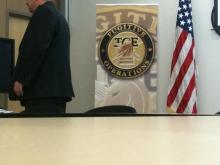
The Teamsters' decision to actively protect immigrants stems from one of its members, Eber Garcia Vasquez, 54, was deported in August to Guatemala with no criminal record and two pending green card applications for him and his family.
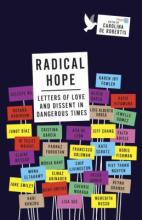
“TO MY FELLOW and artists; to my fellow readers and lovers of art; to my fellow believers in peace and a more perfect world ...”
Thus begins Viet Thanh Nguyen’s contribution to Radical Hope—“a collection of love letters in response to these political times.” The Pulitzer Prize winner (for The Sympathizer) goes on to describe his dreams for a new model for our society, one that includes prophecies, poets, and the people: “Those of us who would tear down walls and eradicate borders, and who believe in both inclusion and equality, need to use our talents to help build a coalition.”
The dozens of letters in Radical Hope illustrate the dreams of this diverse community of writers. Luis Alberto Urrea asks, “What if there is no Other? What if there is only Us?” Katie Kitamura writes of a future in which her daughter grows up believing in the generative power of language. Many of the writers pen poetic reflections on the beacons of light and love who have guided them, looking to the past to bring enlightenment into the next journey. In the final letter, Cristina García imagines the world seven generations from now, asking what that will look like and wishing upon her great-great-great-great-great granddaughter “adventure and loving protection.”

One of the most familiar biblical passages to be read during Advent is from Isaiah 9:6: “For to us a child is born, to us a son is given, and the government will be on his shoulders. And he will be called Wonderful Counselor, Mighty God, Everlasting Father, Prince of Peace.”
At the time it was spoken, the whole world was falling apart, or so it seemed to the eighth-century prophet Isaiah. Looking over history at a string of failed rulers, and staring into the abyss at ongoing chaos and political disaster, Isaiah looked forward to a time when God would send an heir to the throne who would be a different kind of ruler, a divinely appointed one (the Messiah), and his name would tell his character. Isaiah promised a people whose hope was failing that a baby would be born.
But where do babies come from? They come from women, women who endure the discomforts of pregnancy and the excruciating pain of labor to bring forth life.

SOME PEOPLE SEEM to relish being described as “prophetic voices.” I’ve never enjoyed being called that. Old Testament prophets seem rather lonely and cranky, and, despite some of the things I write, I am not cranky after I have my coffee.
I wanted to write this column with more levity, more joy, and more hope. My first upbeat draft didn’t feel quite right, a bit forced, but I submitted it—trying to honor the deadline and ignoring my gut that was telling me the words didn’t match my heart.
Hours later, white supremacists marched at the University of Virginia carrying Tiki torches and shouting Nazi slogans.

As writer, activist and Holocaust survivor Elie Wiesel noted, “Hope is like peace. It is not a gift from God. It is a gift only we can give one another.”

In so many of the gospel stories that are familiar to us, women were behind the scenes — always there, always present, always faithful — but nearly always in the background and hardly ever mentioned by the men in the stories, and certainly not the ones writing the stories. Their testimony as women was not even admissible in court under Jewish law; the word of a woman had no public credibility in that patriarchal culture. But God chose to reveal the miracle of Jesus' resurrection first to women. They were then told to report the astonishing news of the empty tomb to the men.
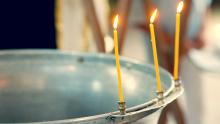
These are turbulent times. 2016 was a turbulent year. But the waters of baptism invite us to hope. We hold our breath, the water splashing against our skin. We hold our breath, anticipating what is to come. We hold our breath, we remember our baptism, and we have hope.

It is heartening to see that hope on display as the vision of a world where all flourish and human agency is honored and sustained. The vision on the website for Black Lives Matter is their Jeremiah’s “purchase ancestral lands.” It is Standing Rock’s protest. It is Breakfast and Book clubs springing up around the country. It is Freedom Schools. It is testament to the sentiment, “It will not always be thus.”

It had been a while since the hashtag of a black man, woman, or child killed by a cop had burned across social media like wildfire. Rather, it seemed the nation had transitioned into a new phase of the struggle — the trial phase.

Since all the political news is terrible and only getting worse, I decided to reflect on something very personal this week — about a great event that happened this weekend.
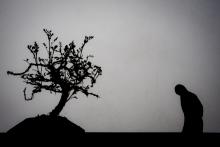
Recently, a friend emailed me that their twenty-three-year-old son had attempted suicide. The young man had been found fairly quickly, but due to the nature of his attempt and his severe depression, he is now in a hospital's psychiatric ward. My friend asked, “How did it get so bad and I didn't know?” She is trying to process guilt and anxiety about what might have happened. Her son is getting the help he needs, but it’s a long journey back to health and wholeness for the entire family.
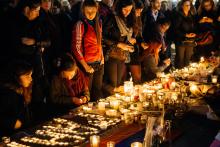
"Instead of preaching, perhaps what is more appropriate is, in fact, confession of how hard it is to actually love our enemies,” says Pastor Jarrod McKenna.
Though this video reflection for Common Grace’s Love Thy Neighbour campaign was filmed a few weeks ago, its pre-scheduled release today goes right to the heart of enemy love and offers a Christian response to terrorism in the days after shocking attacks in Brussels, Istanbul, and elsewhere.
“This teaching is the most often quoted teaching of the early church, because it is the teaching that sums up the cross the easiest,” he says.

For the better part of 50 years, when I thought about Camden, N.J. — if I thought about the city at all — I’d envision driving as quickly as possible through a blighted urban wasteland to get across the Ben Franklin Bridge into Philadelphia.
I didn’t envision young people building boats in a deconsecrated church, or designing websites in a beautifully remodeled house whose walls are covered with original art, or being guided by caring adults through the traumas they’ve experienced and into health, wholeness, and academic achievement.
What a gift, then, to be reintroduced to the city through ministries that bring Camden’s human vitality to the surface, where it shines far above the daunting statistics upon which the city’s troubled reputation is built.

Sometimes it takes a friend to tell you that you’re an idiot. Actually, Anat was kinder than that — in keeping with rabbinic teaching that reproof needs to be done for the benefit of the admonished rather than the admonisher (which is harder than it seems, given the feel-good buzz of self-righteousness).
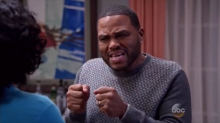
“Let’s say they listen to the cops and get in the car,” Anthony Anderson’s character Dre said Feb. 24 on black-ish, referring to his kids, if they were to be arrested.
“Look what happened to Freddie Gray.”
This week's Wrap was guest curated by Sojourners contributor Adam Ericksen. Read along for his top stories and notes from the week!
There was a lot of negativity in the news this week, but mercy also filled the airwaves. In case you missed it, here’s a list of some merciful events from the week:
1. Pope Francis Opens the Door to ‘Year of Mercy’ in a Time of Fear
Sure, we have some differences, but we’re still crushing on the Pope. “To pass through the holy door means to rediscover the infinite mercy of the Father who welcomes everyone and goes out personally to encounter each of them.”